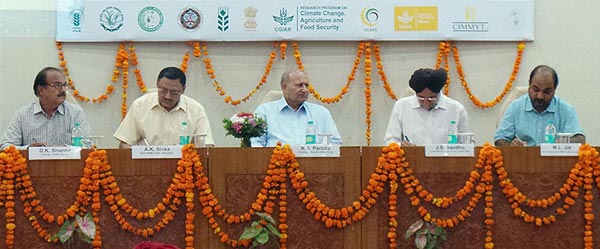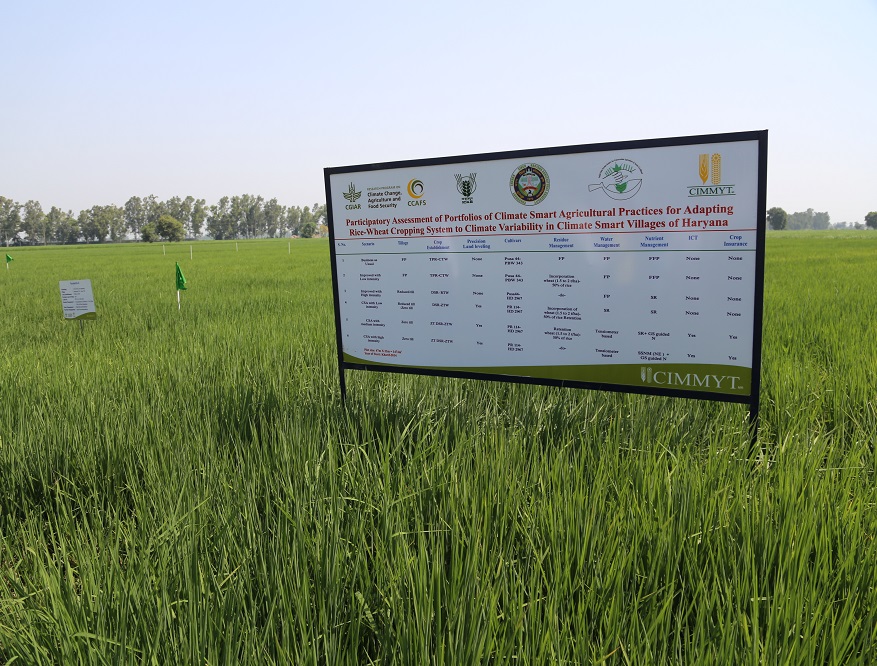“Declining water table, deteriorating soil health, labor shortages, increasing energy prices, and more frequent climate extremes are among the major long-term threats to food security in India,” stated ML Jat, CIMMYT senior cropping systems agronomist, at the Stakeholders’ Consultation on Promoting Resilient Diversification Options through Maize and Climate Smart Practices on 20 May 2013 in Karnal, Haryana, India.

About 300 stakeholders from a range of public and private organizations attended the consultation, including representatives from the Indian Council of Agricultural Research (ICAR), Central Soil Salinity Research Institute (CSSRI), Directorate of Wheat Research (DWR), Ministry of Agriculture, Government of India, the Indian Maize Development Association (IMDA), the International Plant Nutrition Institute (IPNI), the Haryana Agricultural University (HAU), and the State Department of Agriculture, Government of India. After a welcome speech by DK Sharma, CSSRI director, RS Paroda, chairman of the Haryana Farmers Commission at the Government of Haryana and the chief guest of the function, explained the reasons behind the meeting, stressing the criticality of the current situation. “On one hand, we are facing many problems threatening our agricultural system,” he said, “on the other, we are exploring the possibilities of a second Green Revolution for sustainable food and nutritional security in India.” This cannot be achieved without multistakeholder partnerships, as the tasks are numerous: “We need to combine new technologies with active and strategic partnerships, establish an environment in which farmers can easily access markets, and create new business models to make agriculture more attractive to the youth and to women.”
JS Sandhu, agriculture commissioner at the Ministry of Agriculture, Government of India, and the event’s guest of honor, commented on climate extremes which caused a decline in food production during 2012- 13. He stressed the importance of technologies helping with adaptation to and mitigation of climate change effects, such as zero tillage, direct seeded rice, or tools like GreenSeeker, but also the need to diversify rice with maize and other economically competitive and more water efficient crops in the north-western part of India. “Maize is the queen of cereals,” added Alok K Sikka, the event’s chair and deputy director general of the Natural Resource Management at ICAR, “but there has been a 66% decline in maize growing areas in Haryana since the Green Revolution in 1966.” To achieve long-term sustainable ecological intensification of farming systems, Sikka added, conservation agriculture is crucial. Accordingly, several new research initiatives have begun at ICAR focusing on natural resource management. “Partnerships and synergies with advanced research institutes like CIMMYT, CRPs MAIZE, WHEAT, and Climate Change, Agriculture and Food Security (CCAFS), and other research-for-development organizations are critical for impact at scale,” concluded Sikka.
As part of the consultation, panel discussions were held on resilient diversification options through maize (chaired by Sain Dass, IMDA president) and on promoting climate smart practices (chaired by Indu Sharma, DWR director); the discussions were followed by a plenary session chaired by DP Singh (Natural Resource Management expert, Haryana Farmers Commission). The panel discussions reiterated what was said during the presentations and added several new areas of focus, for example the use of information and communication technologies and knowledge networks to provide farmers with real time access to information in an easy-to-understand form.
The event was jointly organized under the aegis of CRPs CCAFS and WHEAT by CIMMYT in collaboration with CSSRI, ICAR, Haryana Farmers Commission, HAU, State Department of Agriculture, Government of Haryana, Ministry of Agriculture, Government of India and Farmer Cooperatives of Climate Smart Villages.

 Climate adaptation and mitigation
Climate adaptation and mitigation 
